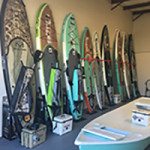
Next time you travel on the six-lane segment of Narcoossee Road near Valencia College’s Lake Nona Campus, look carefully.
On the east side of the road across from Starbucks and Wendy’s there is a nondescript sign that can be easy to miss. “Latitudes,” it says, with a map of the world behind it and capitalized signs saying “RV SUPPLIES” and “PROPANE FILLING STATION” attached to it. However, you wouldn’t want to miss its goal: extending freedom to the world’s marginalized people through fair-trade business.
Simply put, “we are a Christian nonprofit sharing the love and hope of Christ with the isolated, marginalized, and disadvantaged in order to help lift them up out of their difficult circumstances,” said Mark Latham, Latitudes Director since 2012. Latitudes is a business that sees a critical, global need and is seeking to meet it through distributing and marketing traditional products that otherwise wouldn’t be able to be sold.
Arlene Richardson, the founder of Latitudes, and Mark Latham recognized that many people in the world are trapped in a cycle of poverty and corruption that often forces them to accept dubious or illegal job offers that only end up ruining both the people and their communities. The answer? Provide a legitimate business outlet that works on numerous levels: 1) training in business management; 2) providing basic education when possible; 3) helping to develop new products; and 4) making available a market to sell handcrafted, traditional products.
In this way, Latitudes hopes to encourage these crafts in order to promote the artisans as well as ethical business practices that will positively change the global marketplace for future generations. This goal has led Latham and a business staff of four others, including his wife, Amy, who is the product development and merchandising coordinator, to grow Latitudes’ presence so that it now sells crafts from 16 businesses in 13 countries in Africa, Asia and the Middle East.
Because women are so limited in job opportunities in many of those countries, they are a big employment focus for Latitudes. “In most of our areas, we’re working with marginalized women, and they can be from several different backgrounds,” Latham said. “But the women in these countries typically have very few rights, and most of them have very little education.”
Some of the groups the business seeks to reach are looked down upon in their cultures. “We work with some HIV-positive widows in Southeast Asia, and they’re making things like scarves and stuffed animals out of recycled silk saris,” Latham said. “Regardless of what happens with the work, the physical business, they are trained to be an asset to their community as time goes by.”
The number of products sold by Latitudes has grown dramatically since Latham took over as director. Greeting cards, coffee, scarves, pillows, candles, kitchen bowls, necklaces, stuffed dolls, Christmas ornaments – these are just some of the items now available for sale. Another area that has grown dramatically is Latitudes’ internet presence. The web store, latitudestore.com, has improved sales beyond the small gift shop, which is located at the Lake Whippoorwill KOA Store at 12345 Narcoossee Rd.
The clean, attractive Web site includes dropdown menus that allow customers to view cards, coffee, home décor, personal items, jewelry, children’s items, seasonal items and even a “clearance rack” of sorts. The items for sale are pictured along with a price and the country of origin.
Probably the most touching location on the website is the “Artisan Stories” link, which takes the website’s visitor into the worlds of those who have been impacted by Latitudes’ business model. The “stories” page includes videos and links to the people and businesses involved with Latitudes. The videos alone are inspirational and provide the foundation for why Latitudes exists.
The name “Latitudes” has two thoughts behind it: geographically, the nonprofit engages in small business development in different locations globally. And, perhaps more important, the word latitudes represents the freedom they hope the artisans involved will experience through the removal of obstacles or restrictions in their lives.
“Jesus wasn’t just challenging people with their religious devotion or their broken lives,” Latham said. “He met people’s needs. Several times, you read that He had compassion. He had compassion on the crowd, He had compassion on the people. So, it seems like half the time that His works were recorded, He was meeting physical needs. He was feeding people, He was healing people. He didn’t leave them in their distress.
“If we’re to be like Christ, we have to meet the needs of those that we’re working with, those that we’re engaged with in relationship.”


